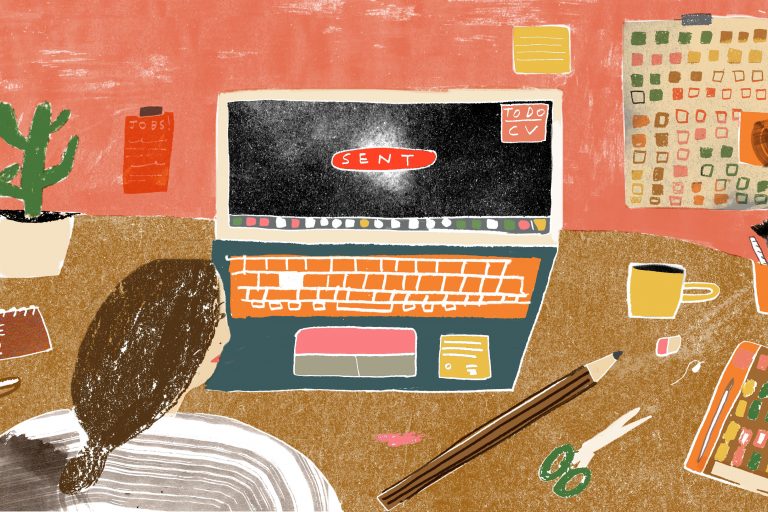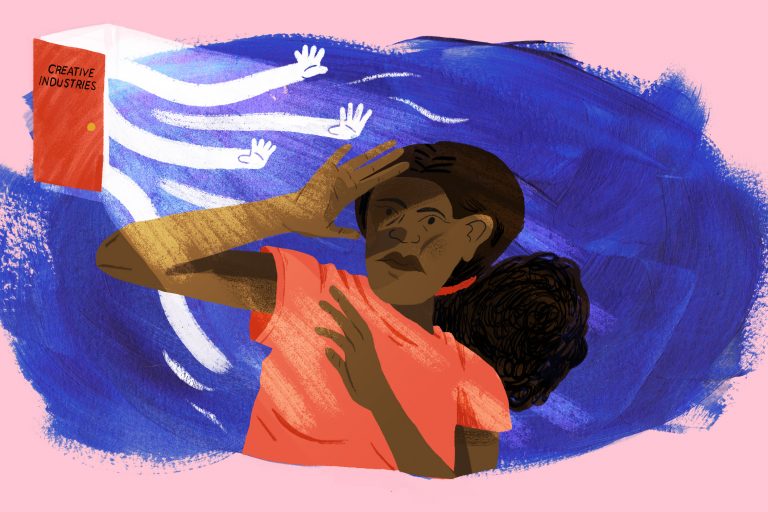
The Tip of the Iceberg
The recent revelations from Everpress serve a stark warning that workplace racism is still a systemic issue in the creative industries
Words by Alec Dudson
Illustration by Grace Lister
The creative industries like to think that they don’t have a diversity problem. They do. They like to think that they aren’t largely composed of systems that reinforce structural racism. They are. They like to work with Black talent, but they don’t build systems that enable talent to rise to positions of power and influence. They like to present that they’re engaged and responsible, yet for a sector with communication at the core, they seem largely unable to avoid tripping themselves up with empty sentiments, acts of virtue signalling and statements that are direct, harmful contradictions of their actions.
I set up Intern in 2013 to challenge the reductive systems within the creative industries that make it incredibly hard (and in many cases impossible) for marginalised people to access the industry. While there has been some progress in the culture around internships — where unpaid ‘opportunities’ completely exclude large sections of society — little work is being done at a structural level to look after and care for those diverse voices if they arrive in junior roles. The past month has placed a well overdue focus on how the workplace is often a deeply problematic space for Black employees at all levels and sectors, safe to say that the creative industries have not emerged unscathed.
Blackout Tuesday, which morphed from an initiative by Jamila Thomas and Brianna Agyemang under the hashtag #TheShowMustBePaused, emerged as an unintentional trap that many creative businesses proceeded to tumble into. Within hours of the trend to upload black squares to Instagram — often with either no comment or using the hashtag #BlackLivesMatter — there were calls for people to understand that this was, in fact, a hindrance rather than a help.
During times of protest and organisation, the BLM hashtag is a widely used means of sharing vital information, quickly, not to mention its existence as an archive of police brutality that can reach wide audiences before media or political censorship can interfere. It’s not a perfect system of course, but an adaption of existing technology and connectivity that has helped to organise a movement which finally has the world’s attention since 17yr old Darnella Frazier uploaded her ten-minute video of George Floyd’s murder to Facebook.
In a trend which quickly swept Instagram, well-meaning individuals were for the most part unintentionally clogging up the BLM hashtag and as many are coming to realise, their error was a condition of their privilege. Much has and will be said about this and as individuals, all white people need to use this opportunity to learn about and unpick the conscious and subconscious biases that they carry with them daily. The grace and empathy with which the Black community has responded to misdirected individual sentiment, speaks volumes to their strength and resolve in the face of a lifetime of being ‘othered’.
Understandably, a little less forgiveness from all corners was afforded to brands and companies who appeared to happily jump on the bandwagon, often unable to resist the opportunity to make a hollow statement which their actions up to that point lay in direct contrast with. As a brand, if you want to reap the benefits of being an established and visible entity, you have to truly understand the responsibility that comes with that platform. Across a range of sectors, frustrated audiences called out the performative actions of companies, which depressingly seemed to jolt many into considering those contradictions, for the very first time.
One response, in particular, stood out in our network, that of Cory Edwards an ex-employee of (ex) go-to t-shirt pre-sale platform Everpress. Across three initial posts, Cory detailed a string of discrimination suffered during his time at the company. In many cases, the actions were overtly racist, including being told that he was “like a Bounty” and that the only reason that he hadn’t been fired was that he was “the only Black guy” at the company. That Cory was subjected to that may come as a surprise to our white readers, yet I suspect for our Black readers, it won’t. I sincerely hope that this last month has been eye-opening in that regard. As we’ve discussed before, the Black experience in the workplace is fundamentally different in the UK to the white one. If you don’t believe that, it’s high time you woke up.
Even more heartbreaking in Cory’s account, was that when he made the company aware of what had happened, aside from an initial expression of outrage, no action or investigation seemed to follow. As an employer, you have a fundamental duty to ensure that your employees feel safe and supported in the workplace and there should always be thorough processes in place for anyone who feels like they’re being mistreated. Somewhat predictably, later when Cory’s conduct was called into question by Everpress, a full investigation took place. Cory’s issue it seemed, was not deemed as important. Just let that sink in for a second. One of your staff tells you that they are the victim of racist slurs in the workplace, you decide that isn’t worthy of a proper investigation.
Three days after Cory posted and hundreds of Instagram users took to both his posts and Everpress’ fabled #TheShowMustBePaused post to voice their disgust with the company for their conduct, a statement emerged from founder Alex Econs. It did not make for comforting reading.
In the first page of four, the statement almost immediately calls Cory’s account into question, an act of gaslighting that did little to convince those who had been awaiting a response of its sincerity. “This incident raises issues far beyond how we have run our business” was another poorly chosen sentiment to include and gave the impression that Econs was unprepared to assume full responsibility for the experiences of an ex-employee.
Influential creators including Rachel Chinouriri, Josh McKenna and Amanda Jasnowski Pascual swiftly poured scorn on the response, amongst some unconfirmed accusations that comments on the post were being deleted. Econs did include his email contact details at the end of the post along with an invitation for people to call him to discuss the matter, but it was not an offer that seemed to gather much traction. While it’s important to note here that there is a willingness on Econs’ part to talk to people on the matter, it seems to have largely been undermined by the tone of his non-apology and subsequent posts that have further called his leadership into question.
Cory responded to the statement the following week, explaining that he had not had a conversation with Alex beyond an initial email, which had not been well received. The damage — lots of it on a personal level — has been done and it’s important to acknowledge that Cory, or anyone else who falls victim to this kind of treatment, should not be expected to “share their point of view” after being completely shut down when attempting to do so through the correct channels. The ordeal of bullying and discrimination has wide mental and physical implications for victims, yet the white-owned and operated media have a terrible habit of asking the Black community to provide “expertise in their own trauma” as Musa Okwonga powerfully puts it in a recent episode of the Stadio podcast.
It’s not good enough that Cory experienced all that he did, it’s even worse that he and countless others have to summon up the courage to call out perpetrators in a public forum. We see this over and over again though. BLM is the collective embodiment for a global community of people who constantly have to fight their own battles because so few of us back them up in the first instance. What Everpress and Econs seem to be lagging behind on is the responsibility to acknowledge, without deflection, that if the workplace lets one person down, then it is broken.
For anyone who wanted to frame Cory’s experience as an outlier, another account emerged on June 8th from Junior Adesanya, another Black ex-employee at Everpress who endured a torrid time at the company. While not detailing overtly racist experiences at the hands of colleagues, upon reflection Junior has sensed “the seeds of an attitude that became that prejudice”. Junior’s post is another deeply upsetting account of a toxic work culture that went on to have profound effects on his health, resulting in debilitating panic attacks, having to move house and shattered self-worth. “It took me at least a year to rebuild myself” he states, “and I wouldn’t wish that on anyone”.
The statement issued thus far strikes Junior as “a cop-out” with a focus on damage control that seemed typical of their attitude towards “problem” employees. Watching colleagues go unpunished for the very actions that you’re being reprimanded for is a degrading experience that eats away at your self-worth. When underpinned by subconscious bias, it’s particularly poisonous and insidious. Niellah Arboine wrote on this subject for us in 2018 and it’s painful to see that the misogynoir that she warned of is rampant at Everpress and many white-owned creative businesses like it. It is not good enough to just expect people to get along, you need to establish a clear framework for your workplace culture.
In a 2019 talk at Forward Festival entitled ‘Use Your Workplace to Create Change’, Kate Moross outlined a range of measures that businesses can implement in order to better ensure that a healthy and genuinely inclusive environment is experienced by all. If business owners and operators can engage with and understand privilege and intersectionality (in all their forms), then firm foundations can exist from which to build that positive space. Kate detailed writing inclusive job adverts and using the workplace as a space for education amongst their recommendations, but this remains one of the few times that a business owner with a similar platform has chosen to (rather than being asked to sit on a themed panel) speak on this topic. Creative business owners need to step up and offer more of the leadership that is often claimed in their LinkedIn bio. Actions, as we’re all acutely aware right now, speak an awful louder than words in this regard.
Writing this opinion piece as a CIS white male, I do so acknowledging my privilege. I take no pleasure in writing about the injustices that others have suffered. My belief when I started Intern remains unchanged. Diversity in creative communication and culture is vital in building an empathetic, rich society that is bettered through sharing fundamentally different perspectives. I don’t aim to be a saviour, nor is that what drives me, but I’ve always felt compelled to use my opportunities to try and help others. Everpress are not alone, rather it’s my understanding that they are a fairly typical example of what Black people experience in the creative workplace.
An email from Alex Econs was widely circulated on June 16th, in which he asks recipients to “hold us ruthlessly accountable as we restart”. I hope that if you’re reading this, then you will absolutely do that as well. Cory and Junior coming forward represent the tip of the iceberg, an uncomfortable truth that is commonplace in this sector. More accounts are arising with each passing week. Stories of flagrant racism involving Berlin-based Salem X, were followed by a female team member leaving the company with a statement outlining further instances of misogyny and corroborating the instances of racism. Futurecity, a cultural placemaking agency based in London have responded to a previous employee speaking out about discrimination and victimisation in the workplace with a dreadfully hollow statement. Proposing to start more conversations with Black artists having only commissioned one in the past while making no reference to the accounts of racism within the company is not being viewed as an acceptable response. A reply within the post’s thread stating that they cannot comment on the case due to the ongoing employment tribunal process has understandably not gathered any sympathy.
If you are a business owner and you don’t have clear processes in place for genuinely inclusive recruitment, employee complaints, codes of conduct and mental health support, then you need to take action now. If you look around your business and only see people who look the same, then there’s a good chance that you’ve got work to do. As a very basic start point, you can use this quick health checker tool on the CIPD website for some initial recommendations. You could also reach out to Black & HR for consultation on processes and allyship with your staff.
If somehow, you’re still not convinced that Black employees around the western world are regularly subjected to all manner of discrimination and othering, then I’d invite you to read more first-hand accounts and insights from the likes of Gal-dem and look at initiatives like Pocc. These conversations were happening long before the tragic events of May 25th and they will go on for a long time after. The challenge now is to not let yet another opportunity for comprehensive and positive change slip by. If as an industry, we can’t take responsibility and lead by example, why should we retain the incredible privilege of making work that speaks to global audiences?
If you’re not a business owner, then you can still make a difference by turning up the pressure on those who systematically fail their black staff. That there have been responses is something of a positive, but now is not the time to be patting Everpress — or any other company shamed into action — cheerfully on the back. The new page created by Everpress in response to the fallout from Cory and Junior’s statements, which amusingly can’t be navigated to from their site, outlines a £5000 donation made by the company and was initially unclear about how their share of the money raised through the platform in response to the BLM movement was being handled. Following the release of this piece, the page has been updated.
Many creators have already moved their projects from the platform, particularly those who are raising money for BLM, bail funds and justice campaigns. It’s also worth noting that until Cory’s statement, the charity campaigns at Everpress operated without the company contributing to the cause, at all. Everpress typically run these campaigns at cost, which is very different from donating. In posts like this one listing their 11 favourite fundraiser t-shirts, it’s worth clarifying that the donations from ‘profit’ come entirely from the creators’ revenue. Alex Econs reached out to elucidate that, on average, around a third of the price of a product sold on the platform goes to the creators, a third covers production costs and a third represents profit share for the business. All businesses have to cover costs, but there’s been a long history of Everpress leaning in heavily on the “money they raise” and despite their change of tack on BLM projects as a move to stem the tide of creators leaving the platform, it feels like the image they project outwardly, isn’t representative of what’s actually going on internally, a sentiment that Cory and Junior feel is emblematic of Econs’ damage-limitation motivated handling of their experiences.
At the time of writing, business has returned to normal on Everpress’ social channels and a number of issues raised by Cory and Junior still haven’t been acknowledged. Causing employees to suffer long-term mental health issues, cannot be washed over with a series of blanket statements and performative gestures. What we can see and know now is just the beginning, I expect more people to come forward and more companies to have their toxic cultures outed. For all of those who do share their stories, I’d ask you to consider that many, many more will not feel able to. If true change is going to take place, we need to listen intently, learn objectively and do far better than gaslighting people who have already been made to feel worthless by employers who seemingly have no true interest in the wellbeing of their people, nor the professional space which they’re ultimately responsible for.

An earlier version of this feature suggested that there was a lack of clarity with regard to Everpress’ donations as part of the action laid out on their ‘people’ page. Shortly after the feature was published, Everpress updated that information in response. A move which we welcome.
In another segment, a breakdown of how much money creators were left with was outlined. The calculation was made with Everpress’ price calculator tool which can be accessed here. We were contacted by Everpress and told this was incorrect. While we don’t necessarily agree with that assertion, it is fair to say that the profit share of products sold via Everpress varies depending on elements of the garment. Figures provided by Alex Econs following the publishing of this feature reveal an average split of rough thirds covering creator profit, production/shipping and Everpress’ revenue share.








